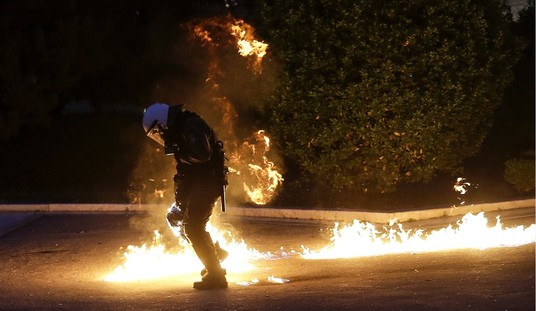Keith Payne at the National Review describes a “national security train wreck” resulting from the administration’s inability to contain Iran. “A November 2011 report by the International Atomic Energy Agency (IAEA) confirmed that Iran has a nuclear-weapons program underway and is working on a nuclear warhead for its Shahab-3 ballistic missile — a missile with a reported range of 2,000 kilometers.”
Nuclear weapons aren’t the only concern. Iran is capable of producing chemical weapons of mass destruction, and also of weaponizing them via delivery systems, according to a report from the U.S. deputy director of national intelligence for analysis…. Equally important, there is no doubt that Iran today is able to attack its neighbors and parts of Europe with ballistic missiles. Iran’s missile arsenal is growing both in numbers and sophistication.
How has the Obama administration exarcerbated this security crisis? First, during its initial years in office, the administration attempted something of a soft-glove approach to Iran — an “engagement” that Iran rebuffed….
The administration also sent the wrong message in its treatment of Libya. There rightly was no Western sympathy for Moammar Qaddafi’s regime. But Qaddafi had agreed to give up his WMD under Western pressure, and the Obama administration’s decision to help dismantle the regime — a decision it almost certainly would have been more reluctant to make if Libya had sustained its WMD programs — could serve only to reinforce Iran’s determination to hold on to its own WMD programs….
The Obama administration’s unprecedented arms-control and nuclear policies also are making matters worse. For decades, many U.S. allies facing dire threats have been protected by the U.S. “extended nuclear deterrent,” also known as the U.S. “nuclear umbrella.” … Absent a credible U.S. nuclear umbrella, key allies facing hostile and lethal neighbors would be under much greater pressure to “go nuclear” themselves…. Yet, just as Iranian nuclear and missile developments converge to pose an imminent security crisis to U.S. allies and highlight their need for credible extended deterrence, the Obama administration has championed nuclear disarmament, moved unilaterally to reduce America’s stock of nuclear weapons, and attempted to scale back their role in extending deterrence. …
In addition, the administration has expressed its commitment to leave behind traditional nuclear deterrence concepts in favor of a new “Mutual Assured Stability.” Under this approach, “states would share an overriding interest in peace and stability,” and “refrain from precipitate actions, and pursue cooperative solutions to international problems.”
This is a critique echoed by David Blumenthal in Foreign Policy, who asks “How many nuclear-armed countries does Obama want in Asia?” The core of his argument is that while the US has been reducing its arsenal vis a vis Russia, China is not similar constrained. This will degrade the US nuclear umbrella to such an extent that technologically advanced countries in East Asia will be pressured by necessity to build their own arsenals.
China, however, is not part of any meaningful nuclear reduction treaties. In addition, it has no incentive to reduce its ballistic missile arsenal. As I previously wrote with Mark Stokes, Beijing is not bound by the Intermediate Nuclear Forces Agreement and therefore can build conventional and nuclear tipped ballistic missiles of all ranges with reckless abandon. Contrast that with the coming stark reduction in U.S. conventional forces in East Asia.
The Obama defense cuts — and make no mistake, there will much less conventional striking power in Asia by the time he leaves office — are all the more problematic given that the president justified his nuclear reductions by claiming that U.S. supremacy in precision-guided conventional weapons changes the calculus of deterrence. The logic was the U.S. can rely on conventional weaponry to have the same effects of nuclear weapons. …
In short, China has every incentive to add to its arsenal. And, without a nuclear, conventional, or missile defense answer, our allies must be growing nervous. According to a State Department report cited by my colleagues Tom Donnelly and David Trachtenburg, “[t]here is clear evidence in diplomatic channels that U.S. assurances to include the nuclear umbrella have been, and continue to be, the single most important reason many allies have foresworn nuclear weapons.” …
The bipartisan success of this decade’s long strategic policy is undeniable. South Korea, Japan, Taiwan, Australia are all quite capable of acquiring nuclear weapons but chose (sometimes with U.S. prodding) not to do so. Now South Korea and Japan have at least two reasons to reconsider-North Korea is a nuclear weapons state and China may be a growing one. Taiwan is less confident that it will get the conventional arms it needs from the U.S., and we would do well to remember that it sought nuclear weapons when it was previously abandoned by the U.S.
And Australia? Global Zero may quickly turn to Global Many.
Add to this the increasing pressure by Russia for America to dismantle its missile shield in Europe and you have the makings of a total collapse of the entire structure of international deterrence. The imminence of the Iranian bomb will almost certainly compel the acquisition, by the Sunni powers, of their own atomic weapons. Moreover, with Europe in disarray and the missile shield uncertain, the threat to Western Europe from an imminent Iranian breakout may bring about something like a German nuclear weapon.
Once such a suggestion might airily be dismissed with the words “Mais non! C’est impossible!” But maybe it’s not so unthinkable any more.
Storming the Castle at Amazon Kindle for $3.99
No Way In at Amazon Kindle $3.99, print $9.99
Tip Jar or Subscribe for $5









Join the conversation as a VIP Member